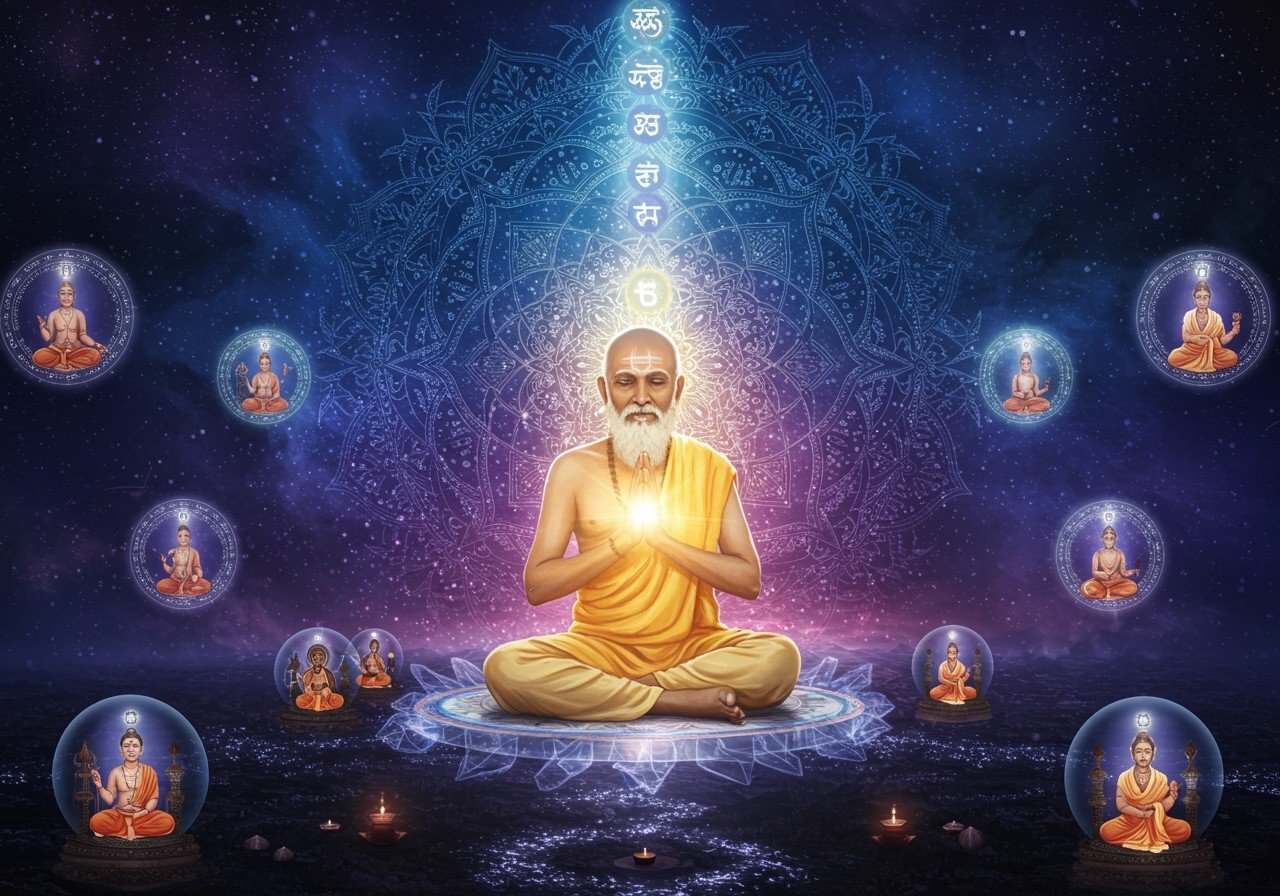
Jnana Yoga, often called the path of wisdom, is a journey of self-discovery and understanding the universe. Originating in ancient Indian philosophy, it’s known for its intellectual rigor and profound insights. This exploration of Jnana Yoga aims to make its ancient practices accessible and understandable for everyone, from seasoned spiritual seekers to curious beginners. It offers a unique perspective on spiritual traditions and personal growth, providing tools for self-reflection and a deeper understanding of life’s purpose.
Understanding Jnana Yoga’s Essence
Jnana Yoga: Wisdom and Self-Realization
Jnana Yoga, meaning the “yoga of knowledge,” emphasizes self-realization through deep understanding. It involves inquiring into the true nature of oneself and the universe. Key to this practice are discernment (Viveka) and detachment (Vairagya). Intellectual understanding and intuition work together to reveal spiritual knowledge. Meditation and contemplation are vital tools on this path. Jnana Yoga is rooted in the Upanishads and Vedanta, complementing other yoga paths such as Bhakti (devotion) and Karma (action). Understanding these concepts can enhance spiritual growth and lay a foundation for meaningful personal development.
Jnana Yoga: A Journey to Self-Discovery
The Core Principle
Jnana Yoga guides practitioners to explore their inner selves. It encourages using the mind to move beyond everyday thoughts and the limitations of the ego. This process can lead to freedom from illusions (Maya) and a realization of the connection between the individual self (Atman) and the universal consciousness (Brahman). This exploration involves focused contemplation and meditative practices.
Self-Realization: The Ultimate Goal
Self-realization is the ultimate aim of Jnana Yoga. It involves gaining profound insight into one’s own being. True unity with the self cannot be achieved without this crucial self-knowledge. Practitioners utilize self-study and reflection to uncover their true essence. This practice cultivates clarity and inner peace, connecting individuals with their spiritual heritage and fostering a deeper understanding of their place within the larger universe.
Techniques of Jnana Yoga
Jnana Yoga utilizes various techniques for self-discovery:
- Self-Study (Swadhyaya): Involves deeply studying sacred texts and scriptures to gain knowledge and understanding of spiritual principles. It also encourages reflecting on one’s own experiences and observations to uncover deeper truths.
- Self-Questioning: A continuous inquiry into the nature of oneself, existence, and reality. It involves challenging pre-conceived notions and seeking genuine understanding through persistent questioning.
- Reflection (Manana): Contemplating on personal experiences, beliefs, and the teachings gleaned from self-study. It allows for integrating knowledge into practical wisdom.
- Meditation (Dhyana): Regular periods of silent meditation to cultivate awareness and stillness. It deepens understanding and promotes a direct experience of one’s true nature.
These practices are believed to foster profound insight and spiritual development, leading to a more fulfilling life.
Discrimination: Seeing the True Nature of Reality
Discrimination, or Viveka, is central to Jnana Yoga. It involves distinguishing between the real and the unreal, the permanent and the impermanent. This ability to discern truth from illusion guides the practitioner towards liberation. It allows for clearer decision-making and a deeper appreciation for the essential aspects of life.
Piercing the Veil of Maya
Jnana Yoga aims to pierce the veil of Maya, the illusion that obscures reality. It achieves this through a dual approach: intellectual understanding and intuitive insight. Together, these help reveal the truth behind appearances. This process can involve challenging one’s perceptions and embracing new perspectives.
The Influence of Advaita Vedanta
Jnana Yoga is strongly influenced by Advaita Vedanta, a non-dualistic philosophical tradition. Advaita Vedanta posits that the individual self (Atman) is identical to the ultimate reality (Brahman). Understanding this concept is considered essential for self-realization. It emphasizes recognizing the inherent unity of all things and moving beyond the perception of separation.
Living Jnana Yoga Every Day
Jnana Yoga can be incorporated into daily life through mindful living and conscious decision-making. Self-reflection helps navigate personal challenges and cultivate inner peace. This practice can lead to increased clarity, emotional balance, and a sense of purpose. It promotes making choices aligned with one’s values and understanding.
Figures like Adi Shankaracharya and Ramana Maharshi exemplify Jnana Yoga’s transformative potential. Their lives inspire seekers to pursue this path with dedication and discipline. They serve as role models for those seeking deeper understanding and spiritual fulfillment.
How Poojn.in Can Enhance Your Jnana Yoga Practice
Poojn.in offers a variety of items to support your Jnana Yoga journey, particularly for those who worship Lord Ganesha, the remover of obstacles. We provide:
- Ganesha Idols: Pure brass Ganesha idols in various sizes for your meditation space, promoting focus and devotion. These idols are crafted with intricate details and are perfect for creating a sacred atmosphere.
- Meditation Essentials: Meditation cushions and mats for comfortable practice, allowing you to maintain posture and focus during extended meditation sessions. We offer a range of styles and materials to suit individual preferences.
- Incense and Dhoop: Traditional incense and dhoop to create a sacred and calming environment for meditation and reflection. These aromatic offerings enhance the ambiance and create a conducive atmosphere for spiritual practice.
- Puja Thalis: Brass and copper puja thalis for offerings, adding a traditional element to your spiritual rituals. These beautifully crafted thalis are designed for holding various offerings during ceremonies and prayers.
- Sacred Texts: A curated selection of sacred texts and books on Vedantic philosophy to deepen your understanding of Jnana Yoga. Explore the wisdom of ancient scriptures and learn from renowned scholars.
- Clothing: Pure cotton meditation shawls and yoga wear for comfortable and mindful practice. These garments are made from natural materials and are ideal for maintaining a sense of purity during spiritual practices.
Our products are sourced from reputable manufacturers and temples across India, ensuring authenticity and quality. Each item is ritually purified before being shipped. Visit Poojn.in to see our full collection. We offer pan-India delivery with secure packaging and tracking. For bulk orders for ashrams or spiritual centers, please contact customer service.
Shop Ganesha Idols at Poojn.in
Browse Meditation Supplies at Poojn.in
Embarking on Your Jnana Yoga Journey
Jnana Yoga offers a profound path to self-realization. It invites exploration of your inner self and its connection to the universe. Self-study, reflection, and meditation cultivate wisdom and clarity, leading to a peaceful and meaningful life. Incorporating Jnana Yoga into your daily life necessitates discrimination—understanding what is truly real and lasting. This journey is both intellectual and deeply personal, drawing inspiration from Advaita Vedanta. Guided by the wisdom of figures like Adi Shankaracharya and Ramana Maharshi, your path can be filled with tranquility and insight. May your journey with Jnana Yoga be enriching and transformative.
Common Questions about Jnana Yoga
What is Jnana Yoga?
Jnana Yoga emphasizes knowledge and wisdom as the path to liberation. It involves deep self-inquiry and understanding the nature of reality. It is a path of intellectual and spiritual exploration, aimed at realizing the true self.
How is Jnana Yoga different from other yoga forms?
Unlike Hatha Yoga’s physical postures or Bhakti Yoga’s devotion, Jnana Yoga prioritizes intellectual understanding and self-inquiry. It focuses on the mind and its power to discern truth from illusion. It’s a path that utilizes study and contemplation to achieve self-realization.
What are the fundamental concepts of Jnana Yoga?
Core concepts include self-inquiry, differentiating between reality and illusion, and realizing the self as pure consciousness. These concepts guide the practitioner toward a deeper understanding of themselves and the universe. They provide a framework for spiritual growth and self-discovery.
Can you provide examples of Jnana Yoga practices?
Jnana Yoga practices encompass meditation, studying scriptures, and engaging in philosophical discussions. These activities stimulate critical thinking and expand one’s understanding of existence. They provide tools for self-reflection and the pursuit of knowledge.
Why is self-inquiry so important in Jnana Yoga?
Self-inquiry challenges ingrained beliefs and assumptions, paving the way for profound self-understanding and self-realization. It encourages practitioners to question the nature of their own being and the world around them. This process of questioning can lead to transformative insights.
How can Jnana Yoga be explained to beginners?
Jnana Yoga is essentially a journey of learning and understanding. It’s about seeking to know your true self and the universe through self-reflection and study. It’s a path of continuous exploration and growth, accessible to anyone willing to engage in the process of self-discovery.
What is the role of sacred texts in Jnana Yoga?
Sacred texts serve as guides and sources of wisdom, providing deeper insights into life and existence. They offer valuable teachings and perspectives, helping practitioners gain a more profound understanding of spiritual principles. They serve as a foundation for the path of knowledge.
Explore Hindu Scriptures: A Detailed Guide
Vedas: Ancient Wisdom for Modern Life


